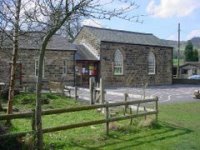So, What Happens Now?
It's 6 July, the deadline for getting letters and e-mails of opposition to DCC. We know that a lot of letters have gone in, as people have been kind enough to send us copies. The letters have been impressive, both for the depth of analysis and their passionate defence of Combs School, Village Hall and Chapel.
The two big reports, from the Village Hall Trust and the School Governors, have been submitted. And the petition has been submitted too. Mrs. Dee Hill (pictured at the end of a cold evening, during the consultation meeting back in May) is the Senior Assistant Education Officer at DCC who now has the task of compiling a report. It will make use of all the input she has received, and go to DCC's Cabinet for review, probably on 4 September.
Mrs. Dee Hill (pictured at the end of a cold evening, during the consultation meeting back in May) is the Senior Assistant Education Officer at DCC who now has the task of compiling a report. It will make use of all the input she has received, and go to DCC's Cabinet for review, probably on 4 September.
Dee has been very thorough in answering the questions we have bombarded her with from many directions, so thank you to her. We also appreciate the assistance given to us by several other members of staff at the Council.
This campaign has been exhausting and has consumed large portions of the lives of people who were already busy before this began. A big thank you to everyone who has been involved.
It's time to draw breath. But the campaign is far from over.
You may want to refer back to 'The Legal Framework' for an explanation of the steps in the process.



.jpg)


.jpg)

